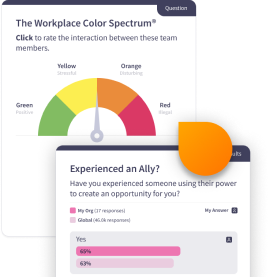
Examples of Risky Conflicts of Interests and Nepotism
Course Video Preview
Accepting a gift from a client in exchange for a favor.As work and personal lives become more intertwined, conflicts of interest have become an unavoidable reality. In today's world, they play a crucial role, influencing not just workplace culture, but also the reputation and brand of an organization. It is crucial for everyone within your organization to have a clear understanding of the rules and expectations in this regard.
Course DescriptionThis conflict of interest course covers some of the most common examples of conflicts of interest, as well as some instances in which the conflict of interest may not be so obvious. We equip managers and HR professionals with the tools to prevent and address conflicts of interest. The training also addresses common misconceptions around conflicts of interest. Interactive polling questions in the course give employers real insight into how employees feel about the concepts and culture skills presented. Emtrain’s innovative Ask the Expert feature gives learners direct access to course experts.
Key Concepts- What conflicts of interest are and how they can influence decision-making and reputation.
- How even the perception of a conflict of interest can hurt the trust and reputation of the people involved.
- Common conflicts of interest related to personal ties, financial interests, and outside activities.
- Practical guidance - particularly to those who may assume that a conflict of interest automatically means they’ve done something wrong.
- Through live action video workplace scenes that show your employees how these issues can be raised and often easily resolved.
Course Features
- Access to our Anonymous Ask the Expert tool
- Rich video scenarios based on real-world events
- Built-in employee sentiment surveys
- 50+ Machine Translation Options
- Optional program timer
- Policy acknowledgement tool
- Extensive customization options

Lessons
Making Clear Decisions
What Are Conflicts of Interest?
Common Issues
How Do People Get Off Track?
How to Handle Conflicts of Interest
Policies and Reporting
Post-Program Survey
Relevant Courses
Complementary Microlessons
Recommended Resources
From ‘Ask the Expert’
Emtrain’s Ask the Expert feature enables users to ask questions about compliance, bias, harassment, and diversity & inclusion as they come up. It’s all confidential, and answers are sent straight to their inbox. View some of the example questions below and see the Experts answers.


